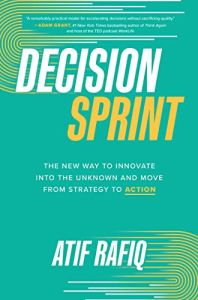Join getAbstract to access the summary!

Join getAbstract to access the summary!
Atif Rafiq
Decision Sprint
The New Way to Innovate into the Unknown and Move from Strategy to Action
McGraw-Hill, 2023
What's inside?
How can you make better decisions? Begin by turning unknowns into knowns.
Recommendation
Donald H. Rumsfeld, President George W. Bush’s defense secretary, popularized the concept of “unknown unknowns”: risks you can’t anticipate because they are rooted in things that you don’t know that you don’t know. In this exploration of smart decision-making, Silicon Valley innovator Atif Rafiq expands on Rumsfeld’s concept. Business leaders must accept that they don’t know everything, he explains, urging them to work proactively to discover unknowns and turn them into knowns by using his “Decision Sprint” system – a process designed to help leaders avoid the pitfalls that derail innovative projects.
Summary
About the Author
Silicon Valley innovator Atif Rafiq held chief executive positions at McDonald’s, Volvo and MGM Resorts and filled executive roles in other corporations. A P&L expert and frequent public speaker, he founded the software app Ritual and serves on several boards of directors.

















Comment on this summary